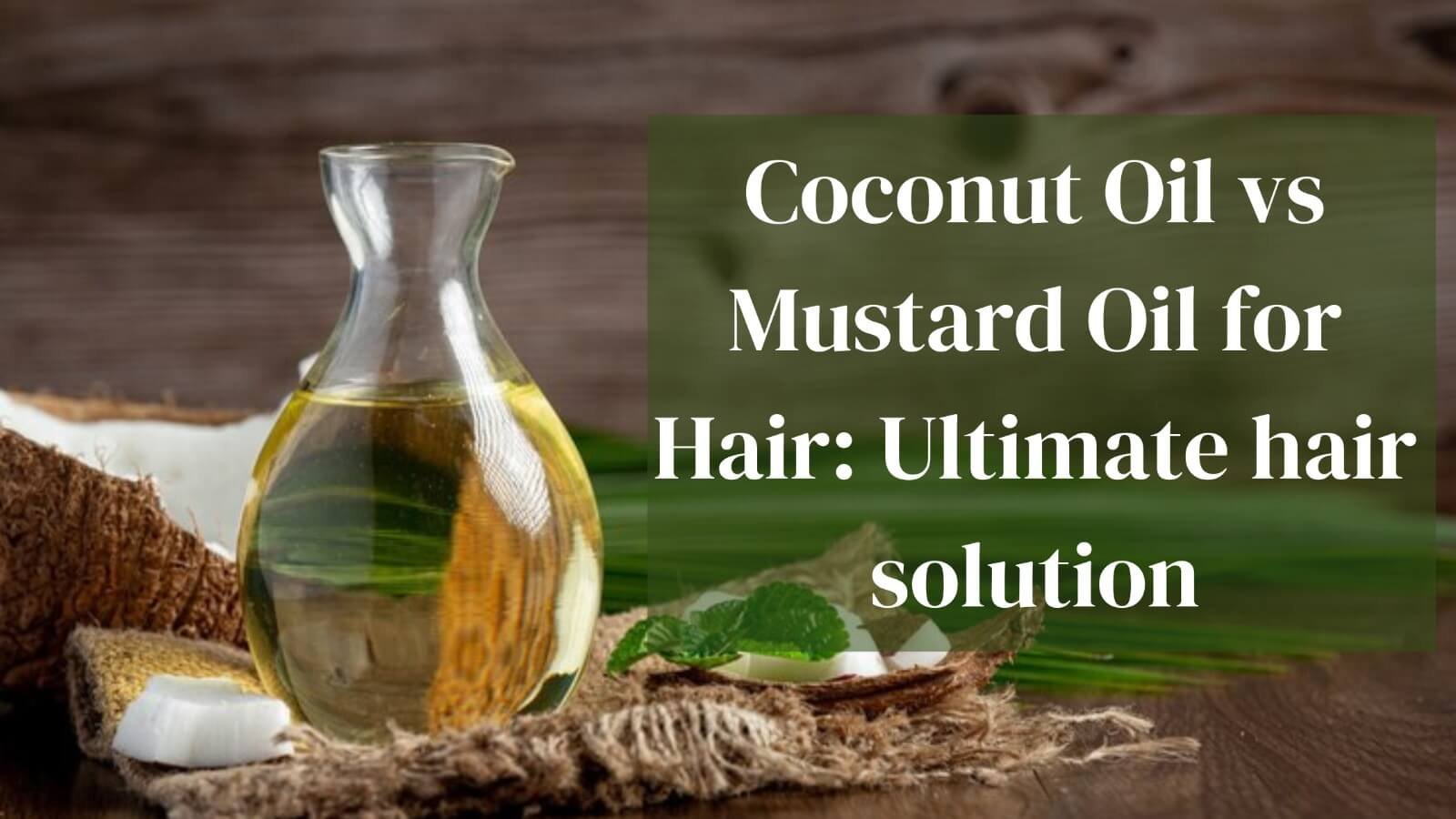Coconut Oil vs Mustard Oil for Hair: Ultimate hair solution
Published: 12 Feb 2025

Hair Oils have long been valued in hair care as all-natural solutions for a wide range of hair issues. Due to their unique qualities and advantages, coconut oil and mustard oil are two of the most widely used options. Which oil is better for hair is still a mystery, though. The best use for each will all be covered in this in-depth comparison of coconut oil vs mustard oil for hair. This blog post will provide you with all the knowledge you need to improve your hair care schedule, from using coconut oil for hair in winter vs mustard oil for hair.
Coconut Oil vs Mustard Oil for Hair: The Ultimate Match
1. Coconut Oil for Hair

In the sphere of hair care, coconut oil has proven itself as a strong force. Kerala coconut oil for hair is especially well-liked in areas like Kerala because it is frequently natural, maintaining its natural nutrients. Because of its medium-chain fatty acids, this type of coconut oil is well-known for its capacity to enter the hair structure and successfully hydrate and nourish your hair from the inside out.
When it comes to using original coconut oil for hair, the benefits are:
- Deep Conditioning: As a coconut oil hair conditioner, it can help repair damage caused by heat styling, environmental factors, and chemical treatments. By using coconut oil on your hair, you can help it retain moisture, keeping it manageable and silky.
- Winter Protection: Winter can be particularly harsh on your hair, leading to dryness and breakage. Coconut oil for hair in winter acts as a protective barrier against the dry air. By using coconut oil in winter for hair, you can keep your hair hydrated and healthy, preventing the dreaded winter frizz.
- Adaptable Serum: Transforming coconut oil into a coconut oil hair serum is an excellent way to maintain shine and manageability. Just a few drops applied to damp or dry hair can help tame frizz, add shine, and serve as a natural heat protectant, making it an essential tool in your hair care arsenal.
2. Mustard Oil for Hair

Mustard oil for hair lies on the other side and is a common household staple due to its culinary and therapeutic qualities. This oil is good for the health of the scalp and hair since it is full of minerals, vitamins (particularly vitamin E), and necessary fatty acids.
- Hair Growth Stimulation: One of the standout benefits of mustard oil is its ability to stimulate the scalp, improving blood circulation. This can lead to stronger and healthier hair growth. For those with thinning hair or hair loss concerns, using mustard oil as a regular treatment may yield positive results in enhancing hair volume and thickness.
- Scalp Health: Mustard oil’s antifungal and antibacterial properties make it excellent for maintaining scalp health. Regular massages with mustard oil can help alleviate dandruff and dry scalp conditions, creating a healthier environment for hair growth. This makes it a beneficial option for those struggling with scalp issues.
- High Level of Consistency: However, it’s worth noting that mustard oil is heavier than coconut oil, which can lead to a greasy residue if not thoroughly washed out. This heaviness makes mustard oil more suitable for specific hair types or conditions, particularly for those with very dry or coarse hair. In contrast, many find coconut oil to be a lighter alternative that is easier to manage.
Comparing Advantages: Coconut Oil vs Mustard Oil for Hair
Moisturizing and Nourishing
When putting coconut oil vs mustard oil for hair, coconut oil often emerges as the superior choice for hydration. Its unique ability to penetrate the hair shaft ensures that moisture is retained, whereas mustard oil primarily works on the scalp and may not provide the same level of hydration for the hair itself.
Flexibility
In terms of flexibility, coconut oil hair serum is a game-changer. You can use it as a deep conditioner, a leave-in serum, and even a styling product. In contrast, mustard oil is typically applied in its raw form or mixed with other oils, limiting its multifunctional uses.
Health of your scalp
If scalp health is your primary concern, mustard oil may take the lead. Its warming properties can enhance circulation and support overall scalp health. However, you should still consider the nourishing aspects of coconut oil. Using both oils can provide a balanced approach to hair and scalp care.
How to Use Coconut Oil and Mustard Oil for Hair
Coconut Oil Applications
- As a Conditioner: For deep conditioning, warm a few tablespoons of original coconut oil for hair and apply it generously from roots to ends. Leave it on for at least 30 minutes or overnight for a more intensive treatment before washing out.
- In Winter: To overcome winter’s dryness, consider using coconut oil for hair in winter before your regular shampoo routine. This method creates a protective layer that prevents moisture loss and keeps your hair hydrated.
- As a Serum: Create a coconut oil hair serum by mixing a few drops of coconut oil with your regular leave-in conditioner or applying it directly to dry hair. This technique helps control frizz and adds a beautiful shine.
Mustard Oil Applications
- Scalp Massage: Warm mustard oil and gently massage it into your scalp. This practice improves blood circulation and nourishes hair follicles. Leave it on for at least 30 minutes before washing out.
- Mix with Other Oils: To soften the potency of mustard oil, consider mixing it with lighter oils such as coconut oil. This blend not only balances the heaviness but also enhances the moisturizing properties of both oils.
- As a Pre-Wash Treatment: For those with dry scalp hair, using mustard oil as a pre-wash treatment can help prepare your hair for cleansing, leaving it nourished and less prone to damage.
Finishing Thoughts: Which one to opts for?
The ultimate choice between coconut oil vs mustard oil for hair comes down to individual needs and hair types. If you are in search of hydration, versatility, and an overall lighter application, coconut oil is likely your best option. Its benefits as a coconut oil hair conditioner and coconut oil hair serum make it a must-have for anyone looking to maintain healthy hair, especially during the harsh winter months.
Conversely, if your primary focus is on scalp stimulation and promoting hair growth, incorporating mustard oil into your routine could yield significant benefits. The warming effects of mustard oil can be particularly advantageous for individuals experiencing hair thinning or scalp issues.
Conclusion
In the epic battle of coconut oil vs mustard oil for hair, both oils have distinct advantages that cater to different needs. Coconut oil shines with its deep moisturizing properties, making it an indispensable choice for hair care, particularly in winter. On the other hand, mustard oil offers unique benefits for scalp health and hair growth.
Consider experimenting with both oils to find the best combination for your hair care routine. By understanding the unique properties of coconut oil and mustard oil, you can take informed steps toward achieving the luscious, healthy hair you’ve always desired. Whether you choose to use coconut oil for hair in winter or explore the stimulating properties of mustard oil, the right oil can make all the difference in your hair care journey.
FAQs
1. What are the main benefits of coconut oil for hair?
Deep conditioning is a well-known benefit of coconut oil. Using original coconut oil for hair can repair damage, enhance shine, and serve as a coconut oil hair conditioner. It’s especially beneficial for coconut oil for hair in winter, helping to lock in moisture during dry months.
2. How does mustard oil benefit hair growth?
Mustard oil stimulates the scalp, enhancing blood flow has the potential to promote healthier and more strong hair growth. Mustard oil can be used as a treatment on a daily basis to help those who are concerned about their hair thinning or hair loss.
3. Is coconut oil or mustard oil better for dry hair?
For those with dry hair, coconut oil is generally a better option as it penetrates the hair shaft, providing deep moisture. However, mustard oil can also be beneficial, especially for very dry or coarse hair types, but its heavier consistency may leave a greasy residue.
4. Can I use coconut oil in winter for my hair?
Absolutely! Coconut oil for hair in winter is highly recommended. It acts as a protective barrier against the dry, cold air, helping to maintain hydration and prevent damage.
5. How can I use coconut oil as a hair serum?
To create a coconut oil hair serum, simply apply a few drops of coconut oil to damp or dry hair. This helps control frizz, adds shine, and protects your hair from heat styling.
6. What is the difference between coconut oil and mustard oil for scalp health?
While mustard oil has antifungal and antibacterial properties that promote scalp health, coconut oil also helps soothe the scalp and moisturize it. Using both oils can create a balanced approach to maintaining scalp health.

- Be Respectful
- Stay Relevant
- Stay Positive
- True Feedback
- Encourage Discussion
- Avoid Spamming
- No Fake News
- Don't Copy-Paste
- No Personal Attacks

- Be Respectful
- Stay Relevant
- Stay Positive
- True Feedback
- Encourage Discussion
- Avoid Spamming
- No Fake News
- Don't Copy-Paste
- No Personal Attacks





